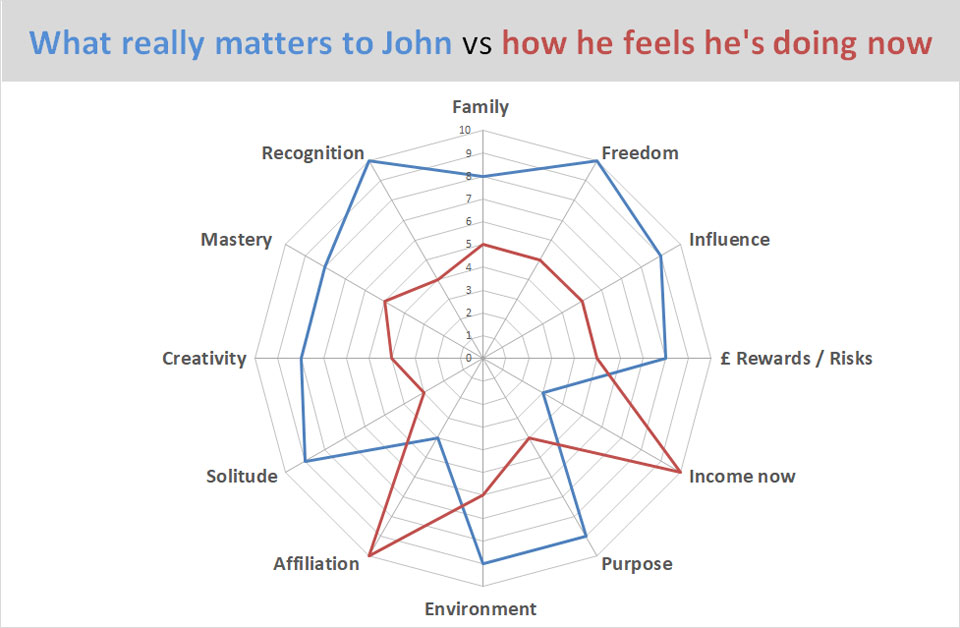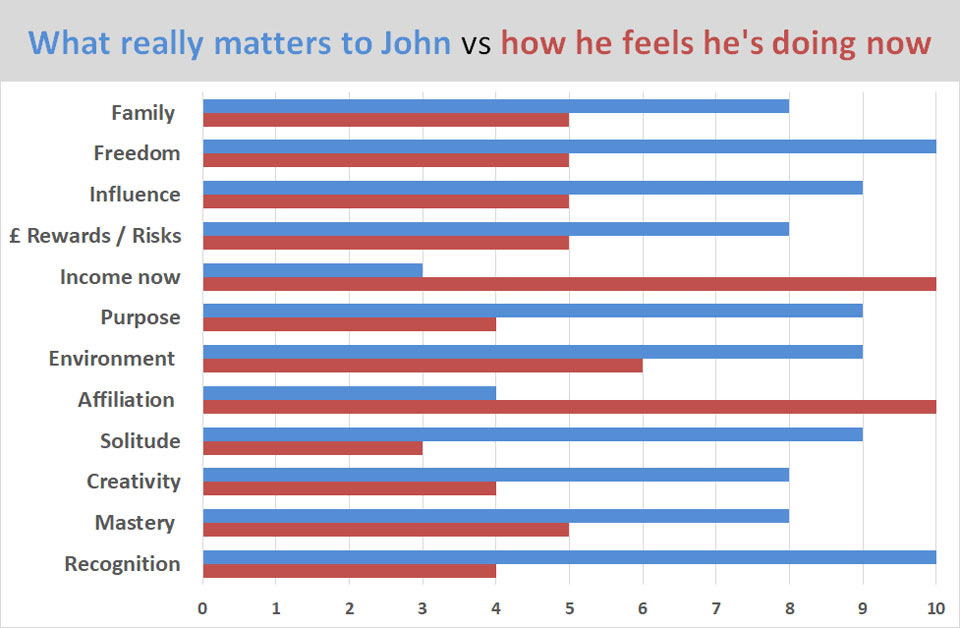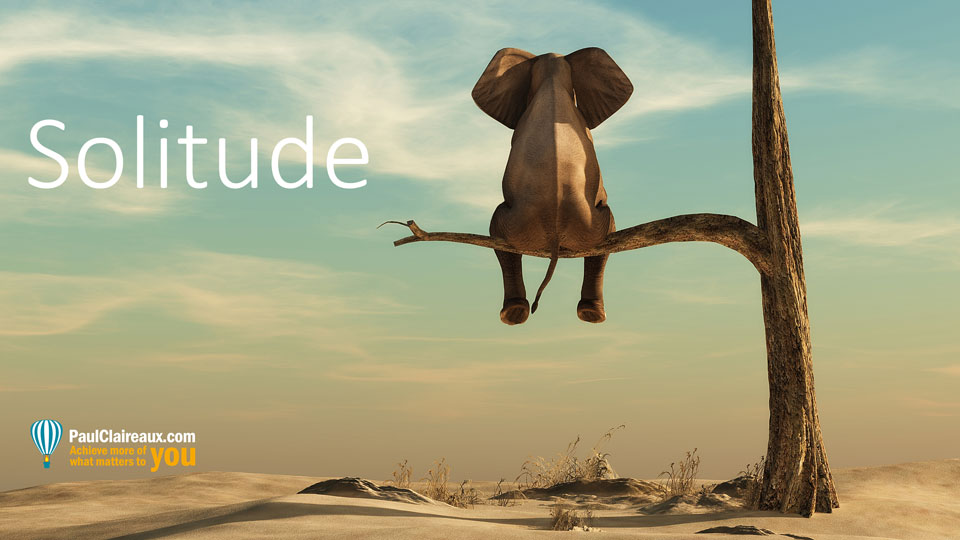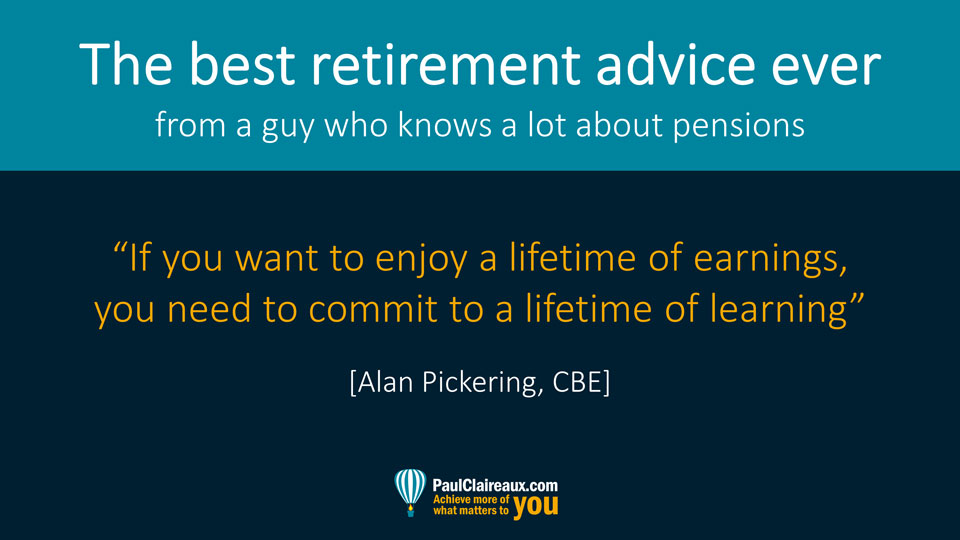12 things to consider before you make a big change in direction
in your career, or your business.

If you plan to continue working for several years but are thinking about changing direction, this Insight is for you.
What really matters to you?
If we ‘choose to accept this mission’, this is the question we must explore.
After all, who would turn their life upside down on a whim without considering if it fits with what they want in life?
Who would ignore the impact of a significant change in their direction on the lives of (or their relationship with) their loved ones?
OK, yes, some of us do that, and some may change direction many times without thinking if it fits with what they care about.
Feel the fear and…
Perhaps you’ve heard people say,
You’ve got to feel the fear and do it anyway?
And that’s certainly the line motivational gurus use to lure you into their ‘get rich quick’ seminars.
The thing is, if you’re seriously looking to change direction in your life, your fear is a natural and healthy response to the risks you’re facing.
So, whatever you do, do NOT ignore your fear about a big change in direction.
Look it in the eye and learn from it.
Share your concerns and take guidance from a coach, too – even Bill Gates would advise you to do that.
Just be sure to find someone capable of providing the support you need.
Someone who’s 100% independent.
Do not employ someone who takes your money for urging you to take leaps in the dark.
And do not waste your money on expensive seminars or programmes led by gurus with simplistic (one rule for all) ideas.
Yes, you’ll see testimonials from those who loved the programme.
And you might even find one or two genuine stories of success.
(They’re not going to market these seminars with all those stories from people who made the leap and fell flat on their faces – are they?)
The hard truth, however, is that few people win – without proper preparation – at the Casino of Life games.
You don’t see the losers because they’re told to leave by the back door and are too embarrassed to talk about it.
Psychologists call this effect (when we only see the winners in high-risk games) ‘Survivorship bias’ – and it’s a common way to be misled.
So, watch out for that; here’s how I picture it in my books.

Remember the golden rule
Shaw’s advice here is brilliant.
There are no golden rules for success.
Even best-selling authors that have tried to find golden rules in business from successful companies, like Jim Collins in his book, ‘Good to Great’, have come in for heavy criticism because many of the so-called great companies he listed went on to fail!
The problem with these books, as Author of ‘Freakonomics’, Economist Steven Levitt observed, is that they’re
mostly backward-looking…
they can’t offer a guide for the future
Don’t forget the role of luck
Most (honest) superstars will admit that ‘luck’ played a part in their success and will talk openly about the ‘lucky’ turning point in their careers.
And, if they don’t, you can normally find a biography that reveals those ‘big break’ moments.
That’s not to say that we can’t glean valuable insights from some superstar entrepreneurs.
Absolutely, we can – and it’s interesting to see how their ideas overlap.
In most of the ‘How I Made it’ type books, you’ll find common advice themes on the need to:
- Recruit an ‘A-Team’ of support staff – ‘Get the right people on the bus’, as Jim Collins said.
- Lead and treat them well so they want to help you drive your business.
- Develop the specialist knowledge and skills you need to be successful.
- Develop a solid business proposition that meets real customer needs.
- Develop your systems to give convenient access to your proposition at a competitive price.
- Work hard and consistently.
- Be reliable in your product/service delivery
- Seriously boost your profile as a thought leader in your field – which you do with great content, of course!
- Consistently deliver helpful ideas – and, yes, that’s what I help my clients achieve.
- Make sure your good works are seen in all the right places at the right times, and perhaps ask some ‘influencers’ to help you achieve that.
Perhaps these broad points are the golden rules, after all?
And you didn’t need to read 20 books or attend ten expensive seminars to learn these ten points, did you? 😉
In any event, the essential point to remember when it comes to your big life plans is this:
You’re different to anyone else
A NEW Insight I’m working on will explore how you are unique- in at least twenty different ways.
 This fact matters when considering what you do with your money.
This fact matters when considering what you do with your money.
And your life plan is just the bigger question behind that.
So, the questions listed below are not in any priority order – and there are no right or wrong answers either.
What matters most to YOU now
and how you feel you’re doing
against these factors
will be different from anyone else.
What’s more, these factors (and your scores) will change over time.
So, you might want to track what matters – and how you feel you’re doing – over the coming years.
It’s something I do, plotting the scores on a spider diagram like this, a fictitious example of John Doe.
Say hello to John!
John is a well-paid but unhappy middle or senior manager working for a drifting ‘Corporation’.
Actually, John Doe’s situation was quite similar to mine a few years ago!
Why is John unhappy?
Well, research (in the wonderful book, ‘Engineering Happiness’) gives us a broad picture of happiness (and unhappiness) arising from the gaps between our expectations and our realities.
And, as you can see, John has a lot of gaps, right now.
In fact, his only positive gaps (where his reality exceeds his needs) are on ‘Income’ and ‘Affiliation’.
His problem (and note it’s unique to him) is that he doesn’t really value all that income he doesn’t want all the ‘affiliation’ he’s getting – mostly in work meetings right now.
He’d rather be joining – or building a NEW tribe of friends with people who share similar values.

Here’s John’s situation as a bar chart

These charts, by the way, are simple enough to map out once you’ve scored the factors that we’ll talk about below, but if you’d like the Excel template, just message me at hello@paulclaireaux.com
I’m happy to share that.
The more challenging part of the exercise is to consider what really matters to us.
How do we feel about where we are now?
And having some support from a highly competent coach is invaluable when you’re doing this kind of introspection work.
Want to give this a go?
If you like the sound of this exercise:
- List the factors below
- Score the importance of each to you now and
- Score where you feel you are in your current work or business roles.
You might not have a life-changing idea, but score the factors anyway.
It’ll give you a much better idea of what really matters to you, and that will then help you to develop ideas if and when you want to.
Alternatively, it may comfort you that you’re OK with your work life – or that you could be with a few small changes.
And, despite what every motivational ‘guru’ will tell you, there’s nothing wrong with that.
What factors could you consider?
Well, you might want to develop your own list of factors over time, but to get you started, here’s my starter list of twelve.
These are the factors I (now) consider before changing my work-life direction.
Some of my family and friends have also found this list useful in their decision-making, and I hope you do, too.
Here are the 12 factors:
1. Family
If you have a family, and especially if you have dependent children or others, this could be an enormous factor in your decision-making.

Just be careful that non-essential family support doesn’t become a reason for not doing what matters to you.
Think hard about what your family really needs from YOU.
Not just now but over the medium to long term, too – and what you think you can realistically provide.
How big a factor (on a scale of 1 -10)
is ‘Family’ on your work choice?
And how do you feel you’re doing on this front now?
2. Freedom
Having the freedom to choose what we do is recognised by Psychologists to be one of our four core motivators.
(the others are on this list, too)

Freedom is key to our sense of well-being.
We all want to feel that we have some control over our goals and our behaviours, and if we don’t have enough of that freedom today, we might want to work towards having more of it.
On a scale of 1 – 10, how much does having
personal freedom matter to you in your work?
And are you getting that level of freedom now?
3. Influence
Having the opportunity to lead a team or influence the direction of projects (or audiences) is important to some people, while others don’t want the stress that can come with such roles.
What level of influence do you need?

On a scale of 1 – 10 how much does
leading or influencing at work matter to you?
And are you having the influence you want now?
4. Medium-term risks and rewards
No business venture or job is completely secure, but some are clearly more so than others, and most jobs generate more income than no job.

So, it’s seldom wise to leave a job before you’ve secured another one – without the funds you need (and a plan) if you want to start a business.
Most of the motivational gurus will tell you to jump into risky ventures – because taking RISKS delivers HIGH RETURNS – but that’s simply not true.
Some risks might work out – others could wipe you out!
On a scale of 1 – 10,
how important is it to you,
to balance the risks and rewards
on your next work move?
And are you getting that balance now?
5. Income NOW
If you’re looking to start your own business (or add another proposition to the one you already have) factor in the unpaid work you’ll have to do to get this up and running.
Most startups also have to spend an extraordinary amount of unpaid time on marketing and sales efforts, to build a pipeline of prospective new clients.
So, factor that into your thinking also. We can’t live on thin air, and nor can those who rely on our income.

If your new business is viable, you should be able to earn good money for your work but most people seriously underestimate the marketing, sales and other admin work involved.
If you don’t have clients queuing up on day 1, think about how long can you keep going with no, or low income, while you build your business up?
On a scale of 1 – 10, how much
does your income level NOW
matter to you?
And where are you, on that scale now?
6. Purpose
Having a purpose is the second of our four core motivators.
This is about doing good for others, or as Psychologist, Scott Geller says, it’s about community.

Most of us want our work to have meaning. We want to contribute to good consequences for others, from our local community to the wider world.
If you need a good list of highly purposeful activities, start with this list of the UN’s sustainable goals – and see where your work could add value.
(My financial well-being work focusses on items 3 and 4, for example)

You don’t need to be too demanding of yourself under this heading. The truth is that most businesses (even banking and other Financial Services) serve a useful purpose, once you understand the needs they meet.
Of course, some businesses don’t serve a useful purpose, and some do real harm – and if you’re struggling to find purpose in your current work, this might be a strong reason to make plans for change.
So, on a scale of 1 – 10 how much
does purpose and meaning
matter to you in your work?
And are you getting that now?
7. Your work environment
Here, I’m talking about the quality of your personal work environment – and its location.

Doing good for the environment is something we all need to work on (in and out of work) – and environmentally positive work is covered under the heading of ‘Purpose’.
Think about time lost travelling vs the benefits of travelling.
The cost vs the benefits (like quiet time to think and work?) of having an office away from your home.
There are no right answers here… what matters is what matters to YOU.
So, on a scale of 1 to 10 how much
does your work environment
and location matter to you?
And hows that working for you now?
8. Affiliation
Affiliation – or good relationships with others – is the third of the big FOUR motivators in this list of 12 factors to consider.
Most of us need it, and this is more than just a superficial acquaintance or an occasional exchange on Social Media.
This is about being accepted – and accepting others for who we are. It’s about seriously listening/paying attention to and supporting others – and enjoying that attention and support ourselves too.
So it’s a big one to consider in your next big move.
Who will you have around you – for support, motivation, or just a chat when you need it?
On a scale of 1-10
how important are your
work relationships to you?
And how are they working for you now?
9. Solitude
Of course, while most of us want some affiliation in our lives – we might not want to be interacting (with colleagues or clients) all day long.

We all need some time alone, and we need some big chunks of time alone, too, if we want to ‘get in the flow’ with our work – to develop ideas, produce something of value or, perhaps, as you’re doing right now, to properly consider our next steps in life?
On a score of 1-10
how important is solo time to you?
And how are you doing
on this score right now?
10. Creativity
Doing creative work can contribute to an upward spiral of positive emotions – and feelings of flourishing in life.

Ideally, you’ll have some creative outlets at work.
Bu if you don’t, you can always get creative outside of work with music, dance, art, design, food… and perhaps even writing a blog or a book to share all your ideas.
You never know; it could even lead you into a new career!
On a scale of 1 – 10
how much does it matter to you,
to be able to create new things at work.
And how’s that working out for you now?
11. Mastery
Mastery is another of our four core motivators.
Most of us like to develop some kind of expertise or skill, though not necessarily with the Piano or anything to do with work.

That said, developing enough ‘mastery’ to become known as the ‘go-to person’ on certain issues, can only serve to boost our work value, and in the long term, what choice do we have?
As Alan Pickering (a previous adviser to the government on pensions issues) once said…

On a scale of 1 – 10 how much
do you want your work
to help you master your skills?
And how much of that does it give you now?
12. Recognition
Research shows that being recognised (personally) for our work is more important to us than extra pay or promotion – or any other reward at work.

The question is – to what extent will your new plan give you opportunities for recognition – and how long might that recognition take if you’re setting up in business?
On a scale of 1 – 10,
how much does being recognised,
for your good works
matter to you.
And where are you now?
What have I missed
That’s my starter list of 12 factors you might want to consider before pushing the button on a complete change in direction in your work life.
You can probably think of others – to add to this list, and I’d love to hear what they are.
If you’re thinking of starting a business or developing a new proposition for the one you run today, there are many other critical factors to consider.
And I’m more than happy to help you explore those, too.
I’d just encourage you to explore these factors first.
Summing up and next steps
You’ll have noticed that I’m keen for you to pursue work – or a business – that delivers more of what matters to you.
This question is so important that I designed my logo around it.

So, I hope this exercise has helped you to consider what YOU want to have (or be or do) after your next big change in direction.
And I encourage you to get some solid coaching support for a journey of this nature.
If you’re unsure what a ‘good coach looks like’ – this Insight should help.
And if you’d like to work with me, tell me what help you feel you need – and let’s talk.
I don’t bite, and I don’t charge for an initial conversation – and I will help if I can.
Just don’t listen to those idiots who say, ‘Ignore your fear’.
As a private pilot for 25 years – I can assure you that your fear serves a valuable purpose – and you should pay attention to it.
Your fear is telling you to get trained on the task you want to undertake!
The Psychologist Albert Bandura worked that out 50 years ago.
Sadly, most of these self-help gurus have never studied Psychology!
They’re too busy helping themselves to your cash!
Thanks for dropping in
Paul
For more ideas to achieve more in your life and make more of your money, sign up to my newsletter
As a thank you, I’ll send you the first chapter of my book, ‘Who misleads you about money?’
Also, for more frequent ideas – and more interaction – you can join my Facebook group here
Share your comments here
You can comment as a guest (just tick that box) or log in with your social media or DISQUS account.





Discuss this article